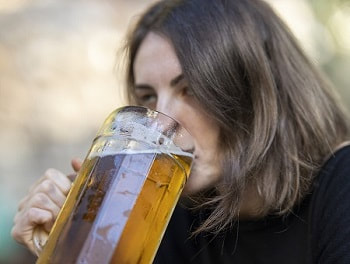Healthy Body
|
|
“It’s always wine o’clock somewhere,” say the ubiquitous plaques, needlepoint pillows, and t-shirts in catalogs and gift shops. A national department store chain is selling $62 T-shirts that read, “Stay In & Drink Champagne.” Other department stores now offer cocktails as you browse their shoe departments. Champagne with your pedicure? Sure. And the Aviation gin commercial, recently produced in response to a holiday Peleton ad that many people found offensive, has two friends plying a third (and by no coincidence the star of the Peleton commercial) with liquor to ease her woes.
You’d think the zeitgeist is shouting into women’s ears, “Wherever you are and whatever you’re doing...drink up.”
The statistics seem to show that it is. Ten years of data (from 2007 to 2017) from the Institute for Health Metrics and Evaluation at the University of Washington shows that alcohol-related deaths among women rose nearly 70% (vs. about 30% for men). And the National Institute on Drug Abuse concluded in 2017 that over the previous 20 years, “more females than males are drinking - and, for the first time in history, more likely to drink by 10th grade than males."
The National Institute on Alcohol and Alcoholism is concerned by this increase in alcohol consumption by both teens and adults. The institute reports that women have more blackouts than men and are more likely to develop chronic mental and physical health issues, including (but not limited to) diabetes, liver and heart disease, cancer, depression, anxiety, and suicidal thoughts and actions.
Heavy drinking can affect fertility because of alcohol’s impact on a woman’s hormonal cycle. Of course, if the woman already is pregnant, “alcohol is one of the things that affects fetal development,” says Dr. Marianne Legato, a New York-based internist and a pioneer in the field of gender-specific medicine.
Speedy Delivery
Women get drunk quicker than men. According to Dr. Legato, “Alcohol absorption in women from the stomach is much more rapid than in men” because women have less body water than men of similar weights. A 180-pound woman is legally intoxicated after three drinks, assuming the average drink is 5 oz. for wine, 12 oz. for beer, and 1.25 oz. of liquor.
You’d think the zeitgeist is shouting into women’s ears, “Wherever you are and whatever you’re doing...drink up.”
The statistics seem to show that it is. Ten years of data (from 2007 to 2017) from the Institute for Health Metrics and Evaluation at the University of Washington shows that alcohol-related deaths among women rose nearly 70% (vs. about 30% for men). And the National Institute on Drug Abuse concluded in 2017 that over the previous 20 years, “more females than males are drinking - and, for the first time in history, more likely to drink by 10th grade than males."
The National Institute on Alcohol and Alcoholism is concerned by this increase in alcohol consumption by both teens and adults. The institute reports that women have more blackouts than men and are more likely to develop chronic mental and physical health issues, including (but not limited to) diabetes, liver and heart disease, cancer, depression, anxiety, and suicidal thoughts and actions.
Heavy drinking can affect fertility because of alcohol’s impact on a woman’s hormonal cycle. Of course, if the woman already is pregnant, “alcohol is one of the things that affects fetal development,” says Dr. Marianne Legato, a New York-based internist and a pioneer in the field of gender-specific medicine.
Speedy Delivery
Women get drunk quicker than men. According to Dr. Legato, “Alcohol absorption in women from the stomach is much more rapid than in men” because women have less body water than men of similar weights. A 180-pound woman is legally intoxicated after three drinks, assuming the average drink is 5 oz. for wine, 12 oz. for beer, and 1.25 oz. of liquor.
Did you know that a standard red-wine glass can hold between 15 and 21 ounces of liquid? So if a woman goes out frequently with friends and has several glasses each time, she reaches the definition of a high-functioning alcoholic.
Binge drinking is also an issue. According to the Centers for Disease Control, “approximately 12% of adult women report binge drinking three times per month, averaging five drinks per binge.”
Find a Healthy Coping Mechanism for Stress Relief
It’s also a bad sign if you’ve come to rely on alcohol as a stress-reliever. Dr. Legato says, “Any agent taken to ‘relieve stress’ is potentially a road to addiction. It’s far better to use your own internal coping mechanisms," or healthy, non-substance-based activities, such as exercise or yoga.
Anything taken to relieve emotional pain may lead to addiction. You have to be on guard," she adds.
Warning Signs
If any of the above warning signs sound familiar, you should seek help. Talk with your family doctor or find an organization that specializes in treating alcohol addiction.
Binge drinking is also an issue. According to the Centers for Disease Control, “approximately 12% of adult women report binge drinking three times per month, averaging five drinks per binge.”
Find a Healthy Coping Mechanism for Stress Relief
It’s also a bad sign if you’ve come to rely on alcohol as a stress-reliever. Dr. Legato says, “Any agent taken to ‘relieve stress’ is potentially a road to addiction. It’s far better to use your own internal coping mechanisms," or healthy, non-substance-based activities, such as exercise or yoga.
Anything taken to relieve emotional pain may lead to addiction. You have to be on guard," she adds.
Warning Signs
- You experience cravings
- You think about drinking instead of the needs of your job or family
- You can’t stop drinking once you’ve started
- You experience withdrawal symptoms
- Your drinking supersedes the pleasure of being out with friends
If any of the above warning signs sound familiar, you should seek help. Talk with your family doctor or find an organization that specializes in treating alcohol addiction.
RESOURCES
Alcoholics Anonymous: “Anyone who wants to stop drinking can find help and recovery in Alcoholics Anonymous,” the organization says. In a recent effort to reach a more diverse cohort, it offers specialized pamphlets for women and LGBTQ alcoholics.
Women for Sobriety: A non-profit, secular recovery group for women with addiction problems. It was created by Jean Kirkpatrick, a sociologist, in 1976 as an alternative to 12-step addiction recovery groups like Alcoholics Anonymous. Only women may attend meetings as the group’s focus is specifically on women's issues.
She Recovers: An international movement of self-identified women in or seeking recovery from a wide variety of issues, including substance use and eating disorders, other behavioral health issues, trauma, abuse, codependency, cancer, grief, low self-esteem, perfectionism and other life challenges.
SubstanceAbuse.com: Signs and symptoms of alcohol abuse/overdose. This site also has a wealth of information on other substances and addiction information.
National Institute on Drug Abuse
National Institute on Alcohol Abuse and Alcoholism
The Foundation for Gender-Specific Medicine: This foundation supports the investigation of the ways in which biological sex and gender affect normal human function and the experience of disease. One of the discipline’s pioneers, Marianne Legato, FACP, MD, established the Foundation as a continuation of her work with The Partnership for Gender-Specific Medicine at Columbia University.
“The Tipsy Mom: Coping Our Way through Motherhood" (Practical Recovery)
“Women are Drinking More, but Getting Less Help for Alcohol Abuse” (Healthline)
Alcoholics Anonymous: “Anyone who wants to stop drinking can find help and recovery in Alcoholics Anonymous,” the organization says. In a recent effort to reach a more diverse cohort, it offers specialized pamphlets for women and LGBTQ alcoholics.
Women for Sobriety: A non-profit, secular recovery group for women with addiction problems. It was created by Jean Kirkpatrick, a sociologist, in 1976 as an alternative to 12-step addiction recovery groups like Alcoholics Anonymous. Only women may attend meetings as the group’s focus is specifically on women's issues.
She Recovers: An international movement of self-identified women in or seeking recovery from a wide variety of issues, including substance use and eating disorders, other behavioral health issues, trauma, abuse, codependency, cancer, grief, low self-esteem, perfectionism and other life challenges.
SubstanceAbuse.com: Signs and symptoms of alcohol abuse/overdose. This site also has a wealth of information on other substances and addiction information.
National Institute on Drug Abuse
National Institute on Alcohol Abuse and Alcoholism
The Foundation for Gender-Specific Medicine: This foundation supports the investigation of the ways in which biological sex and gender affect normal human function and the experience of disease. One of the discipline’s pioneers, Marianne Legato, FACP, MD, established the Foundation as a continuation of her work with The Partnership for Gender-Specific Medicine at Columbia University.
“The Tipsy Mom: Coping Our Way through Motherhood" (Practical Recovery)
“Women are Drinking More, but Getting Less Help for Alcohol Abuse” (Healthline)
Carol Lippert Gray is an award-winning public relations professional and longtime freelance writer and editor. She has been published in fields as diverse as crafts and corporate finance, parenting and philanthropy. She is also a regular contributor for Sanctuary.




